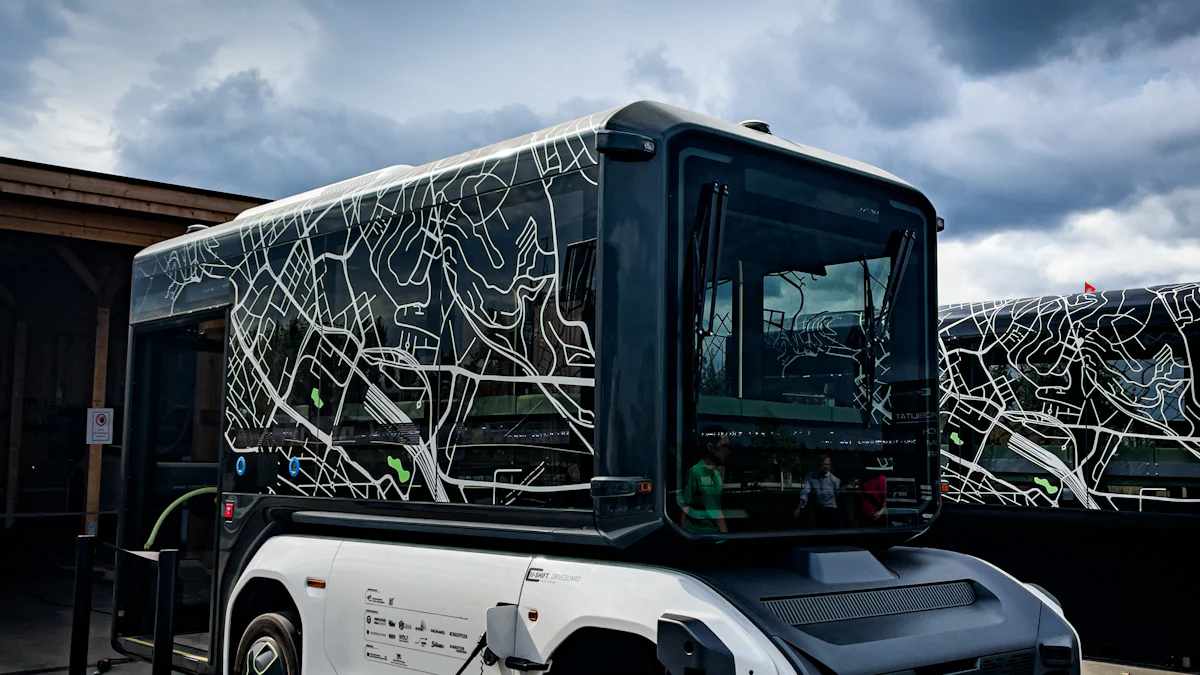Future Trends in AI-Driven Smart Logistics

Logistics plays a crucial role in the modern economy by ensuring the efficient movement of goods and services. AI-Driven Smart Logistics has emerged as a transformative force in this sector. AI optimizes operations, enhances efficiency, and reduces costs. The integration of AI in logistics can increase productivity by an average of 40% and improve operational efficiency by 25% by 2025. This blog will explore the future trends in AI-driven smart logistics.
Current Applications of AI in Logistics

AI in Supply Chain Management
Demand Forecasting
AI-Driven Smart Logistics employs advanced algorithms for demand forecasting. These algorithms analyze historical sales data, market trends, and other factors to predict future demand accurately. Companies can use these insights to optimize inventory levels, reducing both overstock and stockouts. This leads to significant cost savings and improved customer satisfaction.
Inventory Management
AI-Driven Smart Logistics also revolutionizes inventory management. Machine learning models monitor inventory in real-time, providing insights into stock levels, turnover rates, and replenishment needs. This enables companies to maintain optimal inventory levels, reducing carrying costs and minimizing waste. Predictive analytics further enhances inventory management by anticipating demand fluctuations and adjusting stock accordingly.
JUSDA has been actively integrating AI into its supply chain management solutions to enhance operational efficiency and provide innovative services. One of their notable AI products is the JusAI Intelligent Dialogue Engine, which integrates large language models to revolutionize traditional logistics operations. This engine allows users to access services through a single window, perform one-click Q&A, and view all interactions with the chatbot, providing accurate, rapid, and low-cost services. This innovation offers customers an exceptional service experience and opens new possibilities for intelligent supply chain management.
Additionally, JUSDA is exploring the integration of traditional machine learning models. They have made significant progress with the AI Dynamic ETA Intelligent Algorithm project in collaboration with the Ningbo MIT Ning Chuang Academy. This project utilizes machine learning, neural network models, and dynamic/static prediction models to integrate massive amounts of vessel data, predicting arrival times at destination ports more accurately. This enhances supply chain operational efficiency, improves logistics anomaly warnings, reduces operational costs, and mitigates the risk of supply chain disruptions.
Furthermore, JUSDA is involved in the "Zunshida Artificial Intelligence Inventory Management Technology Research Project" with well-known domestic universities. This project uses AI models and historical data to predict future demand and dynamically manage inventory in transit, providing real-time replenishment and shipping suggestions to help manufacturing companies optimize inventory costs.
JUSDA
More than your expectation
AI in Transportation
Route Optimization
Route optimization stands as a critical application of AI-Driven Smart Logistics. AI algorithms analyze traffic patterns, weather conditions, and delivery schedules to determine the most efficient routes. This reduces fuel consumption, lowers transportation costs, and ensures timely deliveries. Companies like UPS have successfully implemented AI-driven route optimization, resulting in substantial operational efficiencies.
Autonomous Vehicles
Autonomous vehicles represent a transformative trend in AI-Driven Smart Logistics. Self-driving trucks and delivery drones are becoming increasingly common. These technologies promise to reduce labor costs, improve safety, and enhance delivery speed. The logistics industry anticipates widespread adoption of autonomous vehicles for last-mile deliveries in the coming years.
AI in Warehousing
Robotics and Automation
AI-Driven Smart Logistics leverages robotics and automation in warehousing. Automated guided vehicles (AGVs) and robotic arms handle tasks such as picking, packing, and sorting. This increases efficiency, reduces human error, and lowers labor costs. Companies like Amazon have integrated AI-driven robotics in their warehouses, achieving remarkable operational efficiencies.
Predictive Maintenance
Predictive maintenance is another vital application of AI-Driven Smart Logistics. AI algorithms analyze data from sensors embedded in machinery to predict potential failures before they occur. This proactive approach minimizes downtime, reduces maintenance costs, and extends the lifespan of equipment. Predictive maintenance ensures that logistics operations run smoothly and efficiently.
Benefits of AI-Driven Smart Logistics
Efficiency and Cost Reduction
Reduced Operational Costs
AI-Driven Smart Logistics significantly reduces operational costs. AI-powered robots increase warehouse efficiency by 50% and reduce labor costs by 70%. AI-driven analytics improve operational efficiency by 20% and reduce supply chain costs by 15%. These advancements optimize processes, resulting in a 10-20% reduction in logistics costs.
Improved Resource Utilization
AI-Driven Smart Logistics enhances resource utilization. Machine learning models monitor inventory in real-time, providing insights into stock levels and turnover rates. This enables companies to maintain optimal inventory levels, reducing carrying costs and minimizing waste. Predictive analytics further enhances inventory management by anticipating demand fluctuations and adjusting stock accordingly.
Enhanced Customer Experience
Faster Delivery Times
AI-Driven Smart Logistics ensures faster delivery times. AI algorithms analyze traffic patterns, weather conditions, and delivery schedules to determine the most efficient routes. This reduces fuel consumption, lowers transportation costs, and ensures timely deliveries. Companies like UPS have successfully implemented AI-driven route optimization, resulting in substantial operational efficiencies.
Real-Time Tracking
AI-Driven Smart Logistics provides real-time tracking. IoT sensors and devices enable supply chain managers to monitor goods throughout the logistics process. This improves supply chain visibility and enhances customer satisfaction. Customers receive real-time updates on their shipments, ensuring transparency and reliability.
Sustainability
Reduced Carbon Footprint
AI-Driven Smart Logistics contributes to sustainability by reducing the carbon footprint. AI algorithms optimize routes, reducing fuel consumption and emissions. Autonomous vehicles and drones further enhance sustainability by utilizing electric power and reducing reliance on fossil fuels. These technologies promote green and sustainable development in the logistics industry.
Energy Efficiency
AI-Driven Smart Logistics improves energy efficiency. AI-powered systems monitor and manage energy consumption in logistics operations. This reduces energy waste and lowers operational costs. Companies adopting AI-driven solutions achieve significant energy savings, contributing to a more sustainable and efficient logistics sector.
Challenges in Implementing AI in Logistics
Technological Barriers
Integration with Legacy Systems
Integrating AI with existing legacy systems presents a significant challenge. Many logistics companies rely on outdated infrastructure. These systems often lack compatibility with modern AI technologies. This incompatibility hinders seamless integration and reduces the potential benefits of AI-driven solutions. Companies must invest in upgrading their infrastructure to fully leverage AI capabilities.
Data Quality and Availability
Data quality and availability play a crucial role in the effectiveness of AI systems. Inaccurate or incomplete data can lead to improper management of the supply chain. The logistics sector often deals with data from various sources, some of which may be unreliable. Ensuring high-quality data requires robust data governance practices. Companies must prioritize data accuracy and consistency to maximize AI's potential.
Economic and Regulatory Issues
High Initial Investment
Implementing AI technologies requires significant investment in both software and hardware. Smaller firms may find these costs prohibitive. High initial investment acts as a barrier to entry for many companies. Despite the long-term benefits, the upfront costs can deter businesses from adopting AI-driven solutions. Companies need to consider the return on investment and explore financing options to overcome this hurdle.
Compliance with Regulations
Regulatory compliance poses another challenge for AI implementation in logistics. The deployment of autonomous vehicles and drones faces strict regulations. Safety concerns and technological limitations have led to setbacks in widespread adoption. Companies must navigate complex regulatory landscapes to ensure compliance. Staying informed about evolving regulations is essential for successful AI integration.
Workforce Impact
Job Displacement
AI-driven automation can lead to job displacement in the logistics sector. Automated systems and robotics reduce the need for manual labor. This shift can result in job losses for workers performing routine tasks. Companies must address the social implications of AI adoption. Providing support for displaced workers through retraining programs can help mitigate the negative impact.
Need for Reskilling
The rise of AI technologies creates a demand for new skill sets. Workers need to adapt to the changing landscape by acquiring skills in AI and machine learning. Reskilling initiatives are essential to prepare the workforce for future roles. Companies must invest in training programs to equip employees with the necessary skills. This proactive approach ensures a smooth transition to AI-driven operations.
Future Outlook and Trends in AI-Driven Smart Logistics

Advanced AI Technologies
Machine Learning and Predictive Analytics
Machine learning and predictive analytics will continue to revolutionize AI-Driven Smart Logistics. These technologies analyze vast amounts of data to forecast demand, optimize routes, and manage inventory. Companies can use these insights to make data-driven decisions, enhancing efficiency and reducing costs. Predictive analytics also helps in anticipating maintenance needs, minimizing downtime and extending equipment lifespan.
Blockchain Integration
Blockchain technology will play a significant role in AI-Driven Smart Logistics. Blockchain ensures transparency and security in the supply chain by providing a decentralized ledger for tracking goods. This technology reduces fraud, improves traceability, and enhances trust among stakeholders. Companies can leverage blockchain to streamline processes, reduce paperwork, and ensure compliance with regulations.
Emerging Business Models
On-Demand Logistics
On-demand logistics will become more prevalent in AI-Driven Smart Logistics. Companies can offer flexible services tailored to customer needs, such as same-day delivery or customized shipping options. AI algorithms can match supply with demand in real-time, optimizing resource allocation and improving customer satisfaction. This model allows businesses to respond quickly to market changes and stay competitive.
Shared Economy Models
Shared economy models will gain traction in AI-Driven Smart Logistics. Companies can share logistics assets such as warehouse space or transportation vehicles, reducing costs and maximizing resource utilization. AI technologies facilitate this sharing by matching available resources with demand efficiently. This approach promotes sustainability and reduces the environmental impact of logistics operations.
Case Studies and Real-World Examples
Successful Implementations
Several companies have successfully implemented AI-Driven Smart Logistics solutions. Amazon uses AI-driven robotics in warehouses to increase efficiency and reduce labor costs. UPS employs AI algorithms for route optimization, resulting in substantial fuel savings and timely deliveries. These implementations showcase the transformative potential of AI in logistics.
Lessons Learned
Lessons from successful implementations highlight the importance of data quality and infrastructure upgrades. High-quality data ensures accurate predictions and efficient operations. Upgrading legacy systems to integrate AI technologies is crucial for maximizing benefits. Companies must invest in training programs to equip employees with the necessary skills for AI-driven operations.
AI holds transformative potential for the logistics industry. Companies like UPS and DHL have demonstrated AI's ability to revolutionize logistics operations. Staying ahead of trends is crucial for businesses aiming to remain competitive. The AI in Logistics Market is forecasted to reach approximately USD 549 billion by 2033, highlighting the rapid growth and importance of AI-driven solutions.
David Cain emphasized, "The AI revolution in logistics is here, and it is incumbent upon us to embrace it, understand it, and harness its potential to drive the future of the industry."
Businesses must invest in AI-driven solutions to enhance efficiency, transparency, and customer satisfaction.
See Also
Unlocking the Hidden Power: AI in Logistics Revealed
Revealing Tomorrow's Supply Chain: AI Integration Perspectives
Artificial Intelligence in Logistics: Transforming Future Supply Chains
Paving the Way: Tomorrow's Logistics with Digital Innovation
